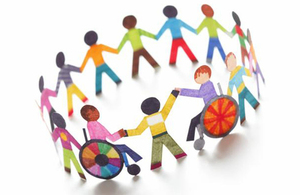Ensuring people with disabilities are not invisible
Guest article by Lucy Drescher, co-chair of the Bond Disability and Development Group.

Image: Bond
Until very recently, the estimated 1 billion people with disabilities in the world have been left behind in the mainstream international development initiative to alleviate global poverty. This was partly as a result of the Millennium Development Goals (MDGs) having no mention of disability.
Change began to take place with the 2008 adoption of the United Nations Convention on the Rights of People with Disabilities (UNCRPD). 160 countries have now ratified the UNCRPD and people with disabilities have started to be included in the laws and institutions of countries around the world. In addition, the new Sustainable Development Goals (SDGs) or Global Goals which were agreed in September include disability which is another major step forward.
We (the Bond Disability and Development Group) were really excited when the International Development Committee in the UK parliament decided to do an in-depth inquiry into disability and development, looking into the work DFID does in this area. The inquiry received more written submissions than any previous inquiry and a number of people with disabilities themselves gave oral evidence. It was clear that despite examples of good practice the work that DFID does and funds was often not including people with disabilities.
DFID responded really positively to the recommendations of the inquiry and promised to produce a framework on disability inclusion. The first Disability Framework was launched a year ago and now we are able to look at what has been achieved so far.
The central team in London now includes three people which has enabled so much more to happen. The team have been working both externally to influence multilaterals and internally with DFID country offices to support them in looking at how to include people with disabilities win their work.
A key area of focus has been how to collect robust and credible data on the numbers of people with disabilities in developing countries and how many are being reached by programmes. Progress in this area will enable us all to see how many people with disabilities are being included, rather than being left behind, in comparison with non-disabled people. We welcome the relaunch of the DFID Disability Framework today and progress DFID has been making to ensure all the work that is funded is disability inclusive.
Lucy Drescher
Lucy Drescher is Head of Parliamentary Advocacy at RESULTS UK, an NGO that uses advocacy to create the public and political will to end extreme poverty. The Bond Disability and Development Group brings together over forty UK-based mainstream and disability specific organisations along with disabled people’s organisations around the world.